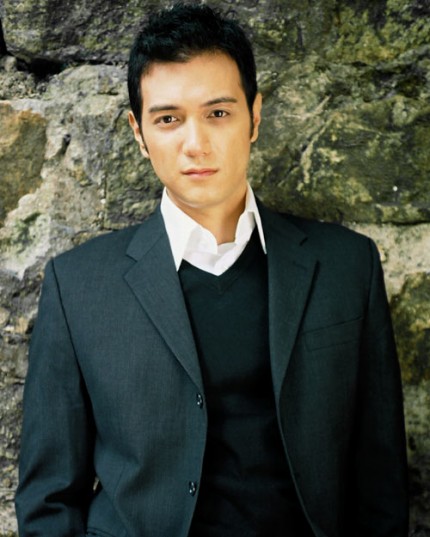Tenor Nicholas Phan to fete composer at UC Presents’ Britten Festival

Nicholas Phan has made the music of Benjamin Britten one of his specialties. The versatile tenor’s critically acclaimed recordings and international recitals continue to draw attention to the composer’s lesser-known and least-performed works.
Two such pieces, Canticles III and V, will be the focus of Phan’s recital Friday night at Mandel Hall as part of the University of Chicago Presents’ Britten Festival.
“Part of Britten’s power is that he’s master of the moment,” Phan said in a recent phone interview from his home in New York City. “He’s a master storyteller.”
The fresh-faced 34-year-old has been a champion of Britten’s music since he first discovered the composer’s correspondences while studying music at the University of Michigan. “I was really taken with the love story between Peter Pears and Benjamin Britten,” he said. “I was just fascinated with their romantic relationship that lasted thirty-five years, that it could spawn such beauty.”
Canticles III and V are, in a sense, documents in music of Britten’s relationship with the tenor Pears, who premiered these and other of the composer’s vocal works. “Pears really was Britten’s muse. He inspired some of the most beautiful music of the last century,” Phan said.
The tenor will open Friday’s recital with Canticle III “Still Falls the Rain,” which will feature pianist Myra Huang and hornist Gail Williams. The music’s profound emotional appeal, the singer noted, has made it a favorite with his audiences. “It’s a very powerful piece to this day, and I think that, definitely, people respond to that,” Phan said.
That’s in large part due to the subject matter. Here, Britten explores the possibility of Christian salvation. The text, taken from Edith Sitwell’s The Raids 1940, draws parallels between Christ’s crucifixion and the London air raids of the Second World War. The music moves between two sound worlds. Haunting and serene tenor phrases break the clamor of biting dissonances and bold, angular lines in the piano and horn.
Britten’s Canticle V “The Death of Saint Narcissus” for tenor and harp, which Phan will perform with harpist Sivan Magen, has softer music textures to fit the poetry’s sexual imagery. “It’s an extraordinarily interesting and beautifully weird piece of music with a beautifully weird piece of poetry,” the singer said of the work. “The setting of the text is quite rich. It’s very colorful and very evocative.”
Britten began reading the poetry of T.S. Eliot in the early 1970s while recovering from health problems, including a slight stroke that affected his right hand. “The Death of Saint Narcissus,” an early poem that Eliot pulled from publication, which became the basis for Britten’s setting, is filled with symbolism. The composer even claimed that he didn’t fully understand the poem.
“I have to say that I think he was lying,” Phan said with a laugh when asked about it. “The poem is, and I say this to audiences when I perform it now, really about the pleasures and sterility of self love. We’re really talking about masturbation here.
“I think that understanding Britten and having done the research on him that I have over the past five or six years, my impression is that he’s too genteel of a person to say that out loud,” he added. “I think he wanted the music and the poetry to speak for itself.”
Phan will round out Friday’s program with a selection of Schubert songs. For the lilting Im Frühling and Frühlingsglaube as well as the spirited Der Musensohn, the tenor will perform with pianist Myra Huang. Williams will rejoin Phan and Huang for a performance of Auf dem Strom, the composer’s setting of Ludwig Rellstab’s verse for tenor, French horn, and piano.
Schubert composed Auf dem Strom for a program of his own music in 1828. Its text, a farewell to love and life itself, tells of a man’s tearful goodbye to his lover as his boat recedes from the shore. “It’s a real joy to sing,” Phan said. “I know sopranos sing it sometimes, but, clearly I’m biased, I do prefer the tenor because I feel like the tenor and horn combination go together so beautifully.”
Britten and Pears frequently programmed Schubert’s songs on recitals. But there are wider similarities between the older master and the English composer. “Schubert is the first composer to really make a piano accompaniment a distinctive voice, and he really was a genius at realizing the text in music,” Phan said.
“Britten did very much the same for English music in his time,” he added. “Even though his music never apologizes for its technical mastery, he still really maintains this clear emotional core. I think he really understood how to communicate to an audience as a composer,” Phan said. “It’s a testament to the power of Benjamin Britten’s music and how great a communicator he was.”
Nicholas Phan will perform songs by Britten and Schubert, with pianist Myra Huang, hornist Gail Williams, and harpist Sivan Magen 7:30 p.m. Friday at Mandel Hall.
chicagopresents.uchicago.edu; 773-702-8068.
Aaron Keebaugh has taught music history at North Shore Community College, Santa Fe College, and the University of Florida, where he earned his Ph.D. in musicology. He presently writes for Boston Classical Review and the Revere Advocate, and lives in Salem, Massachusetts.
Posted in Uncategorized

